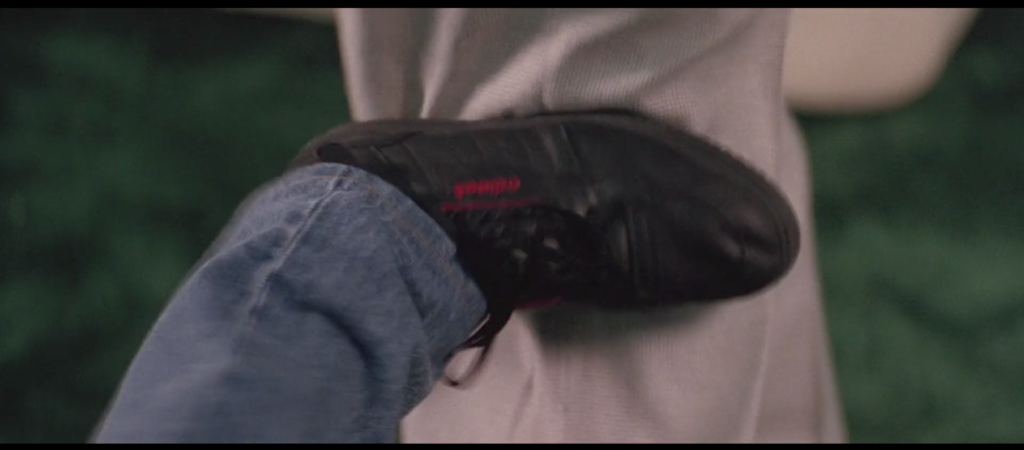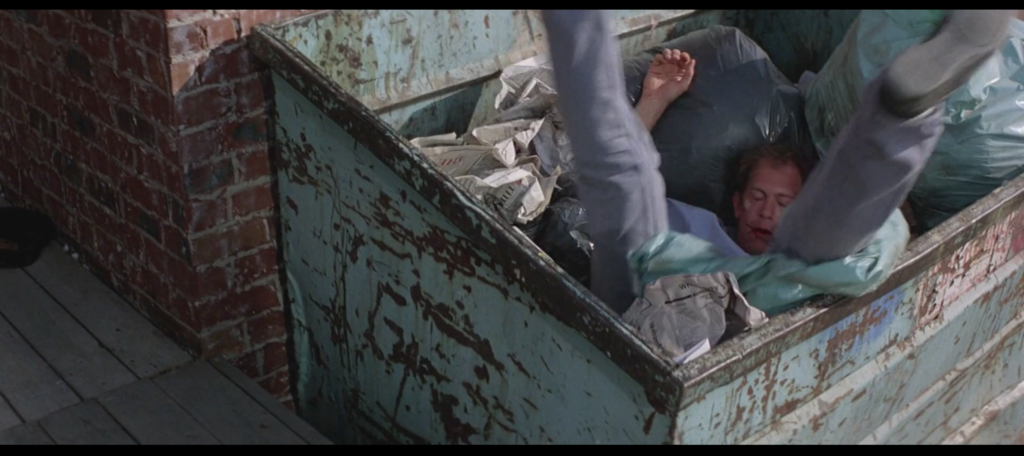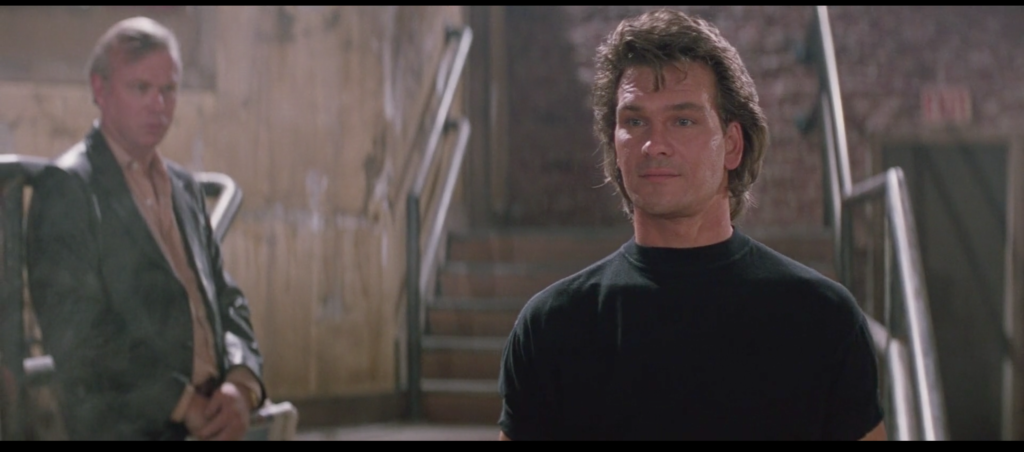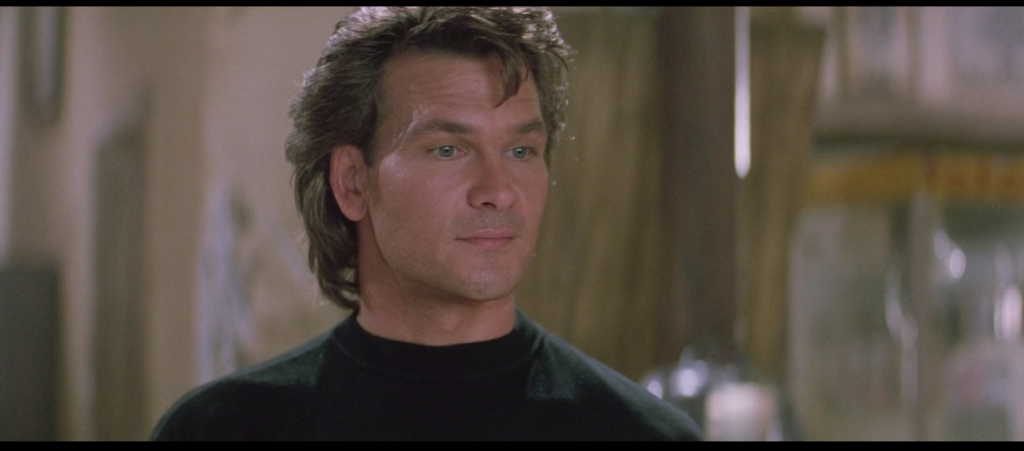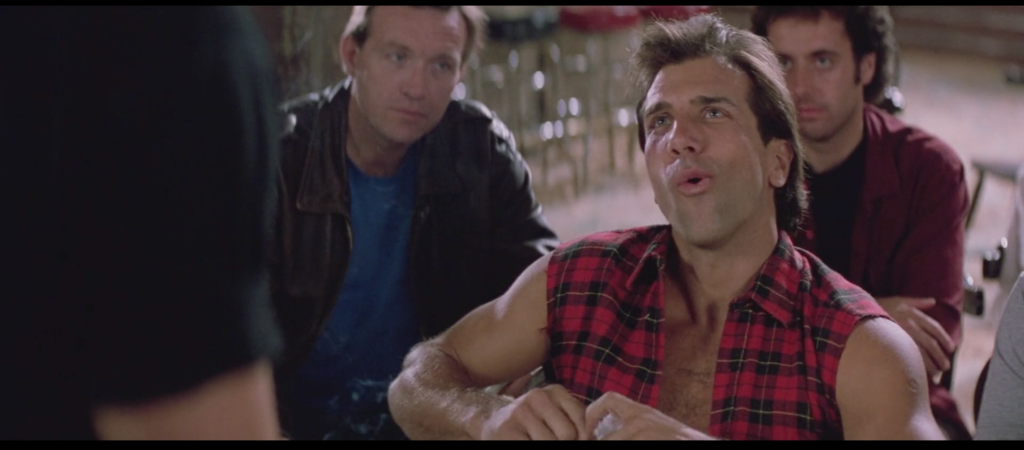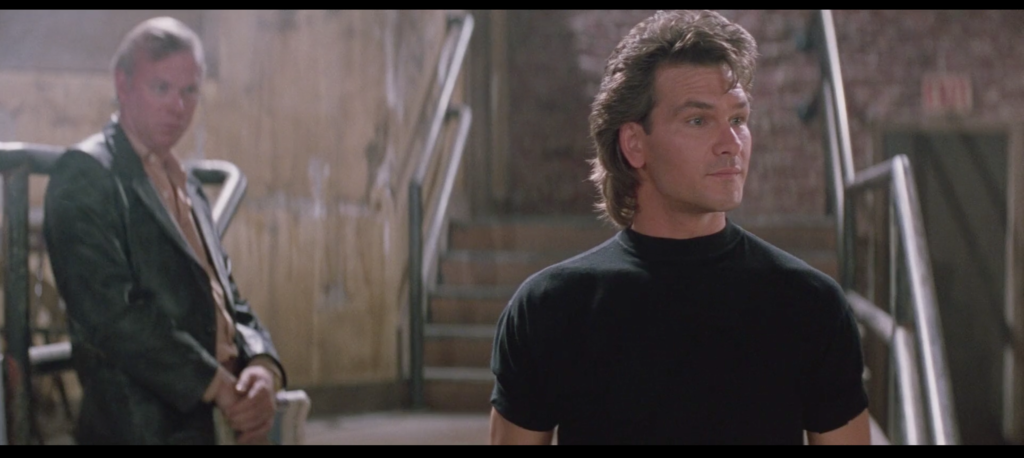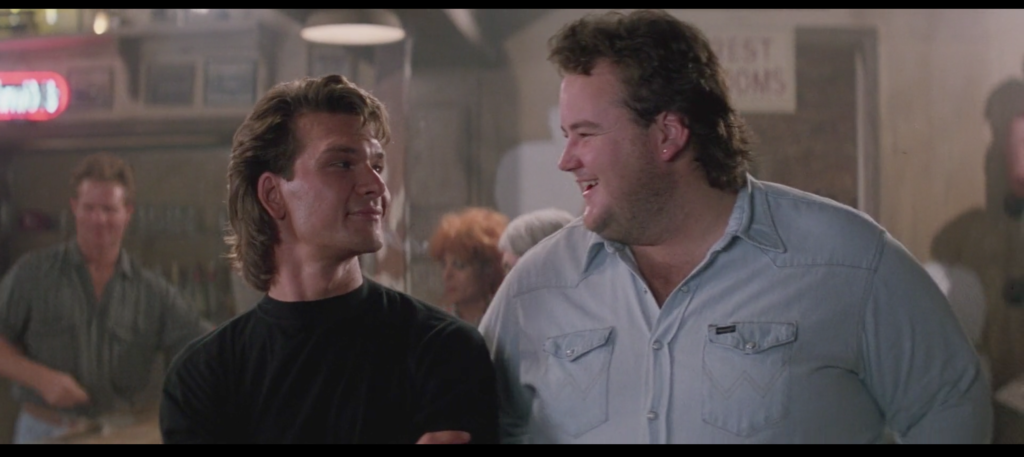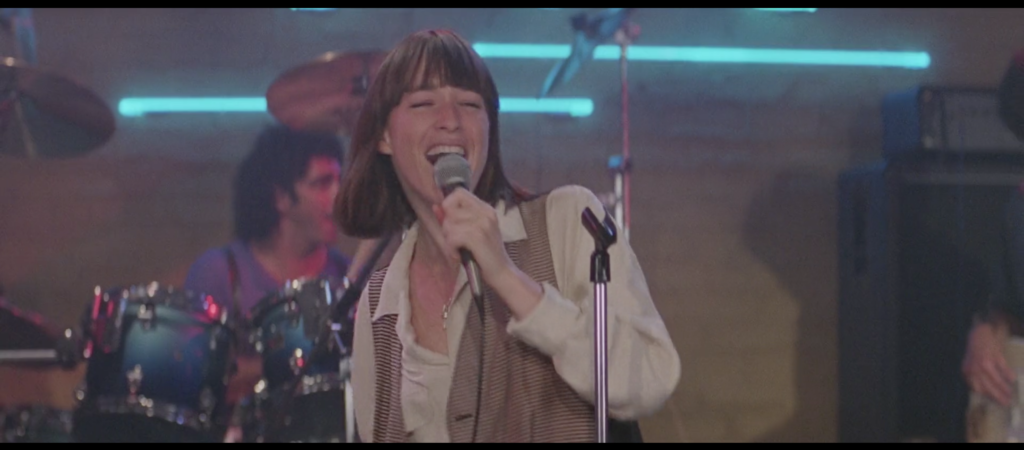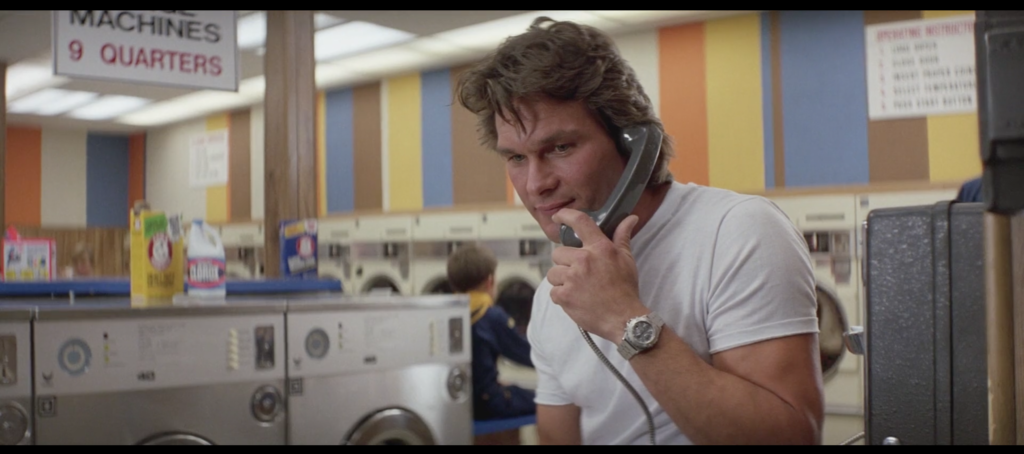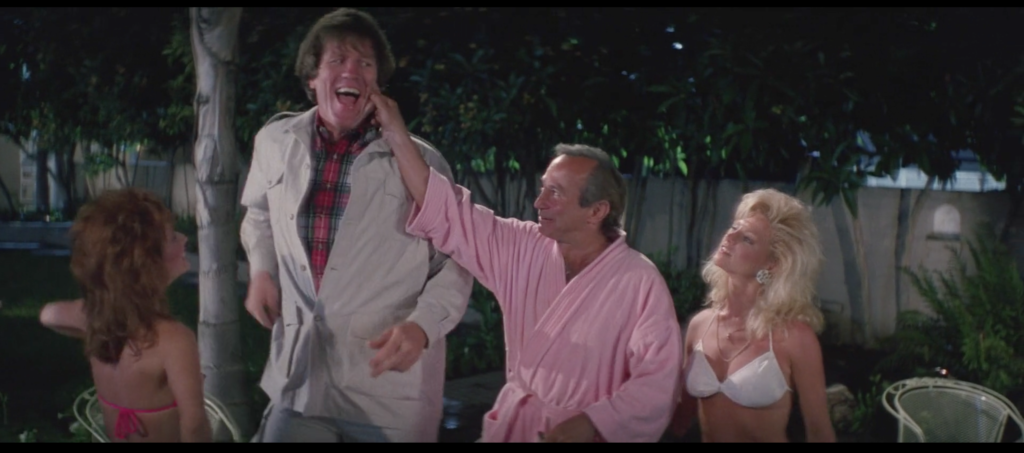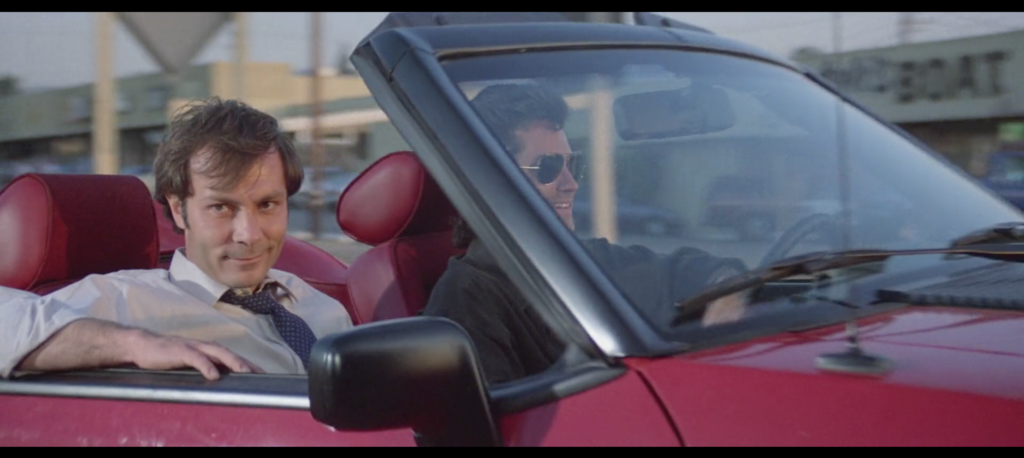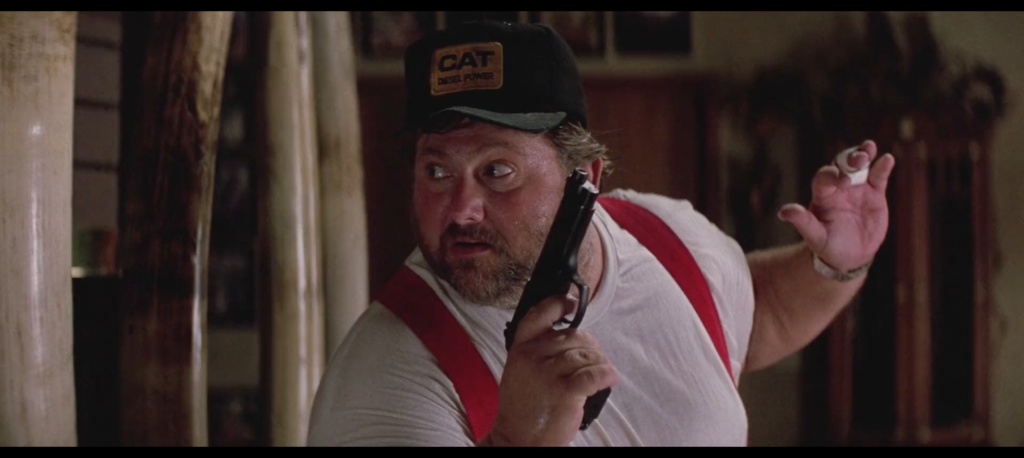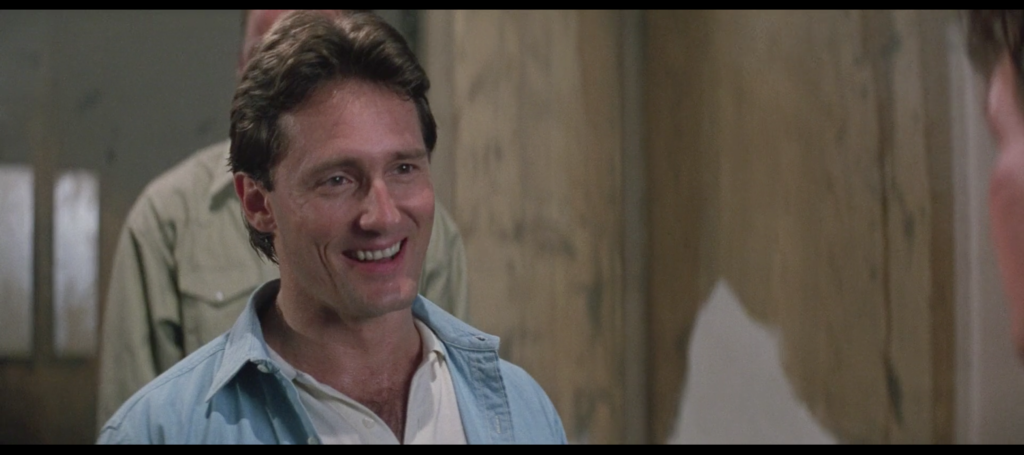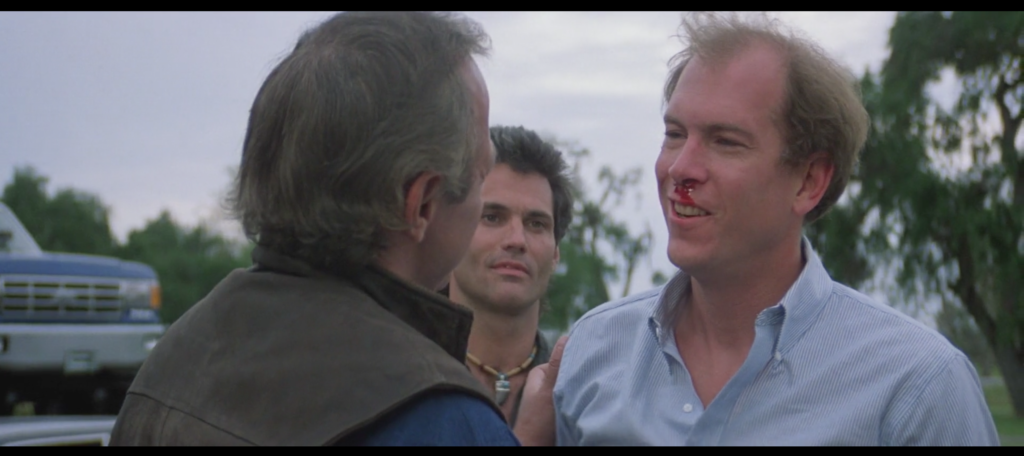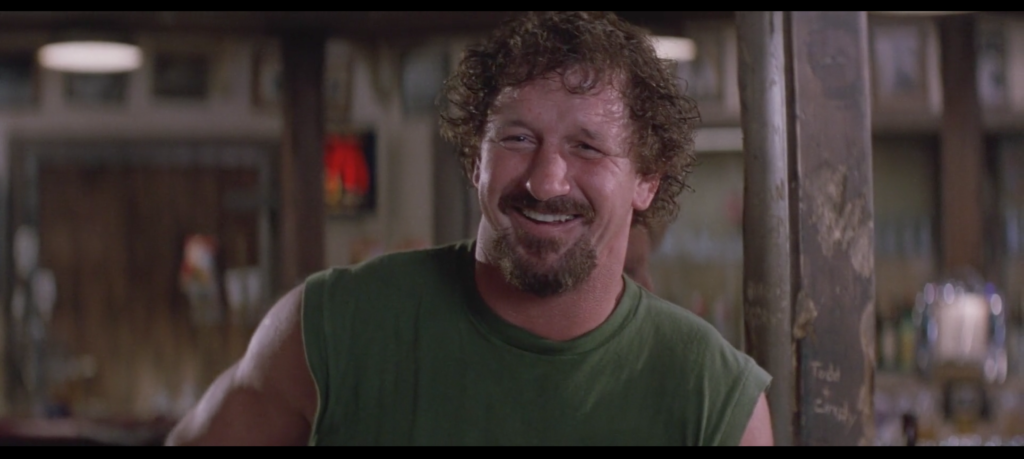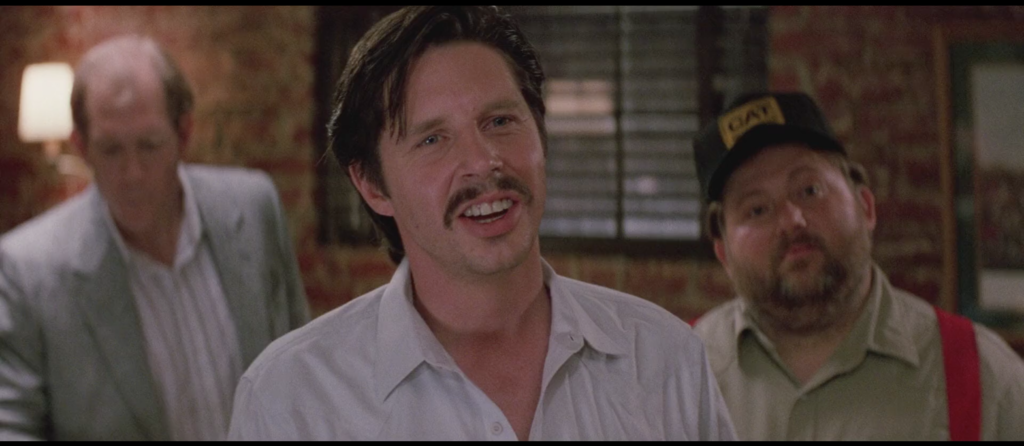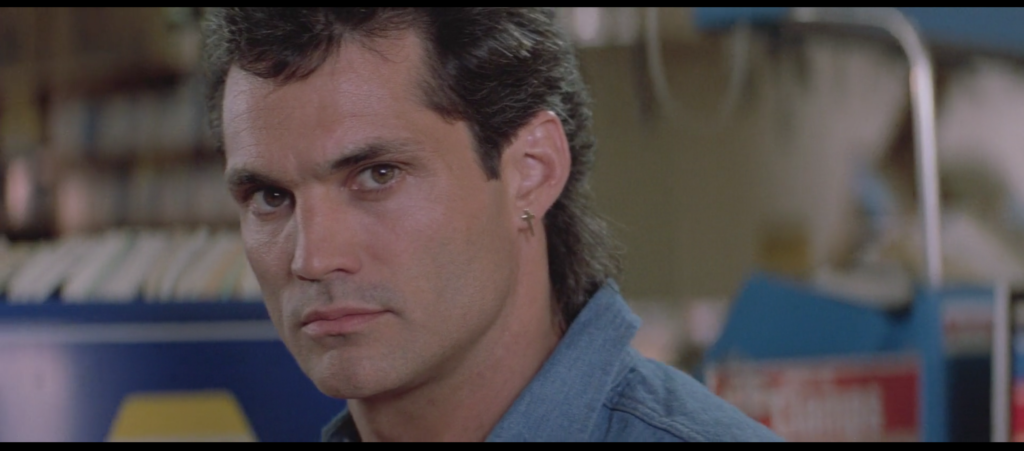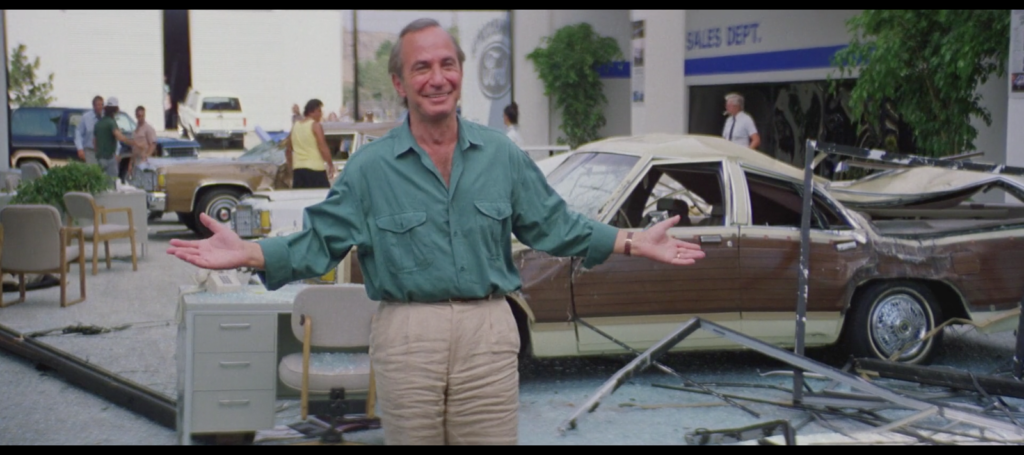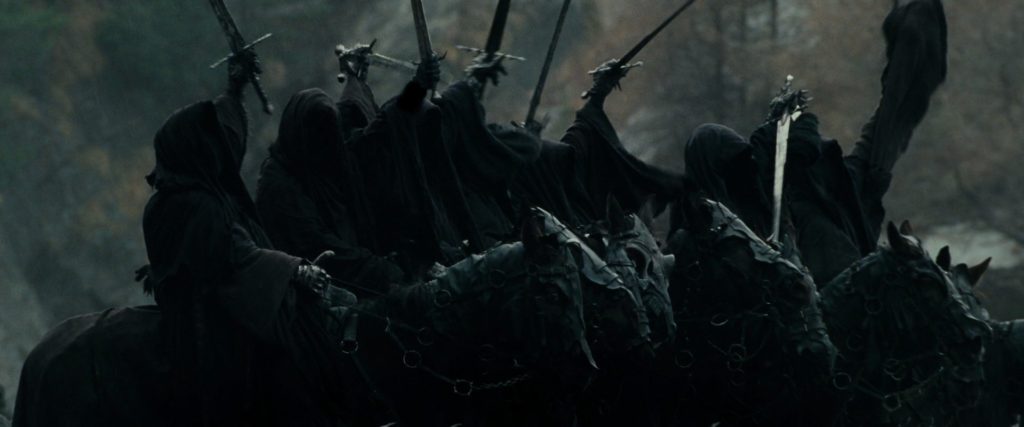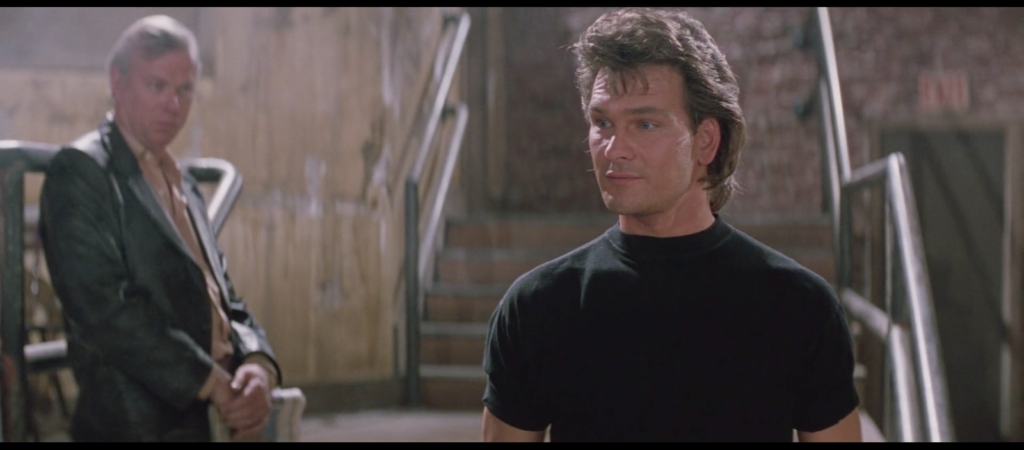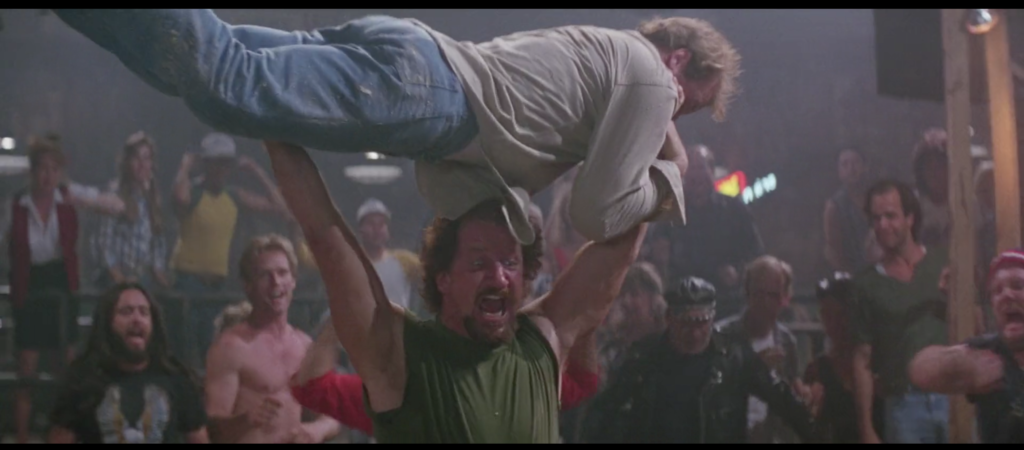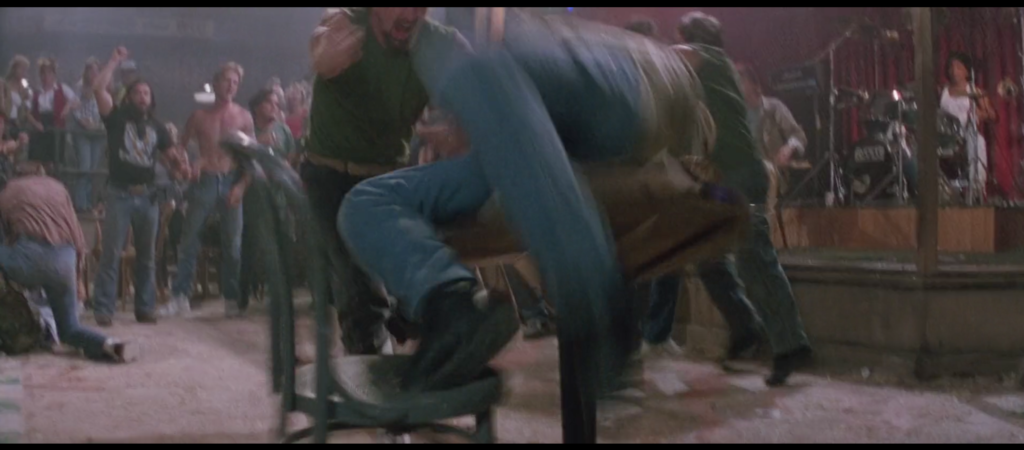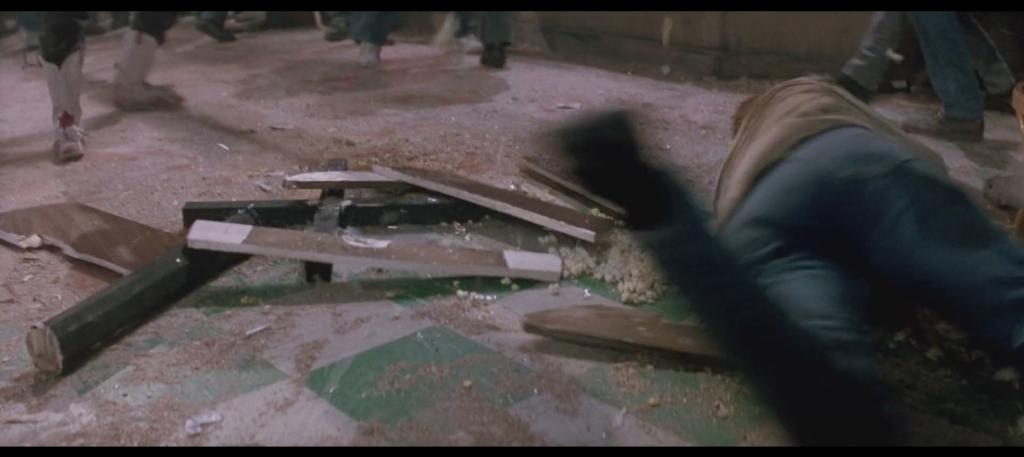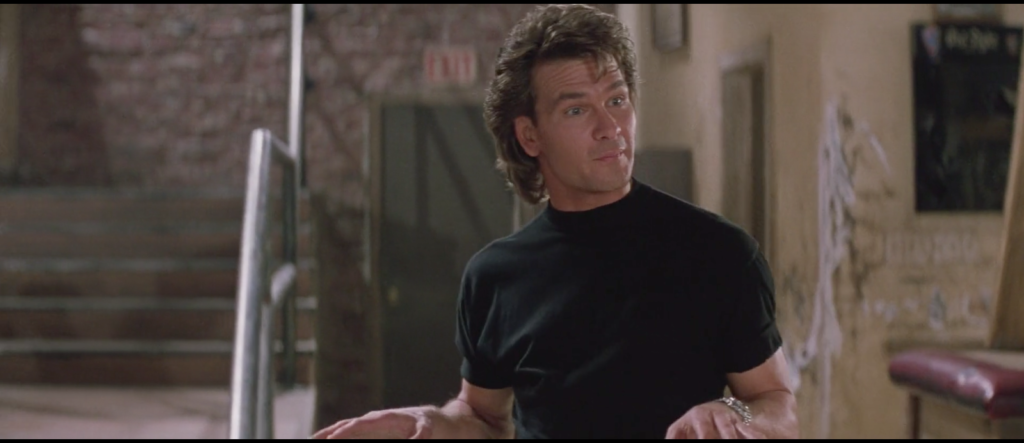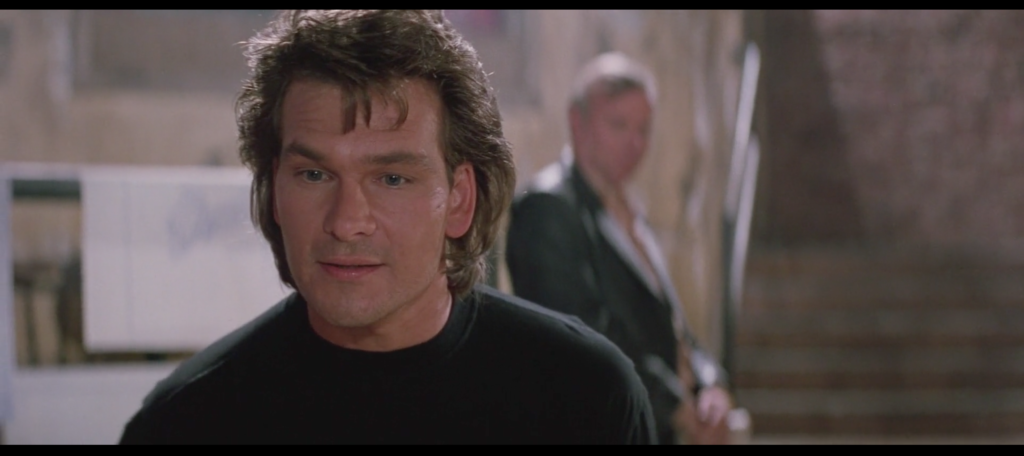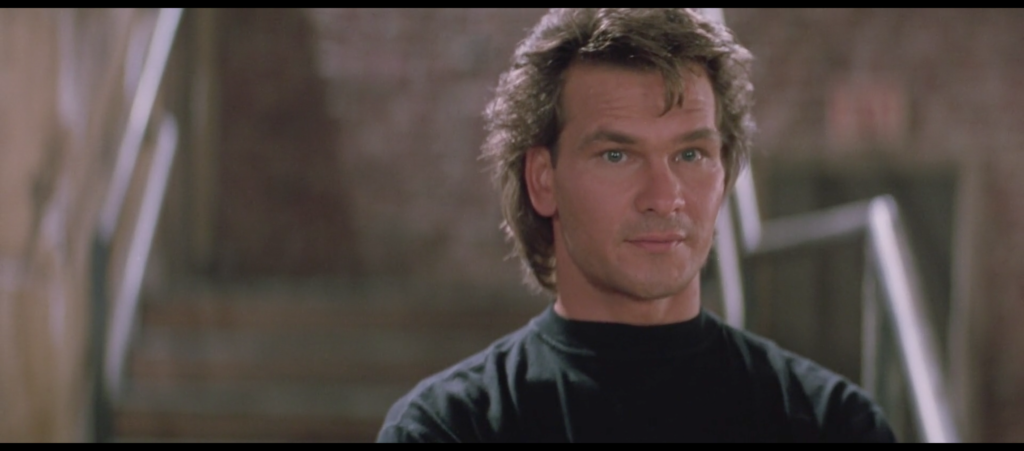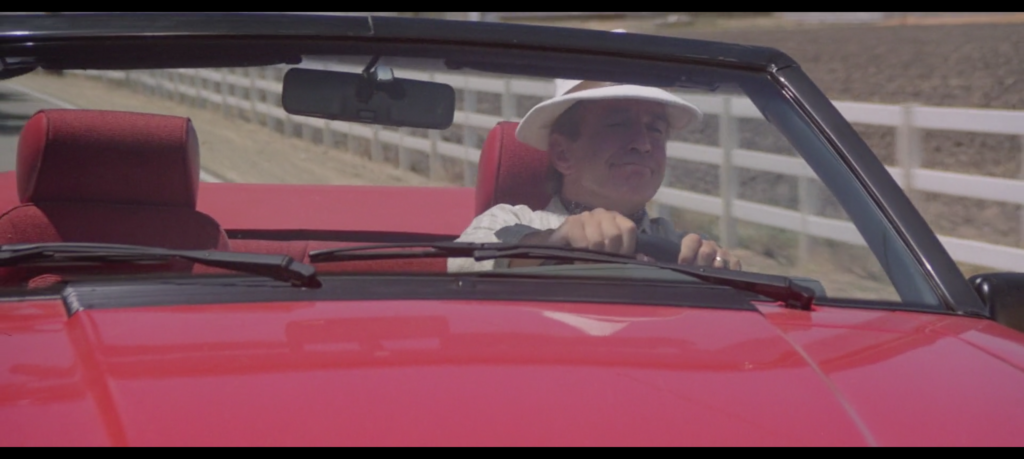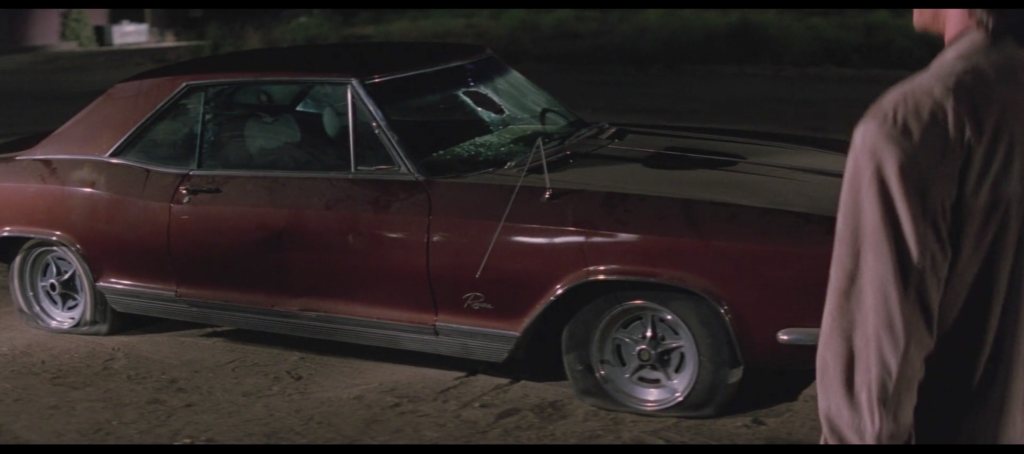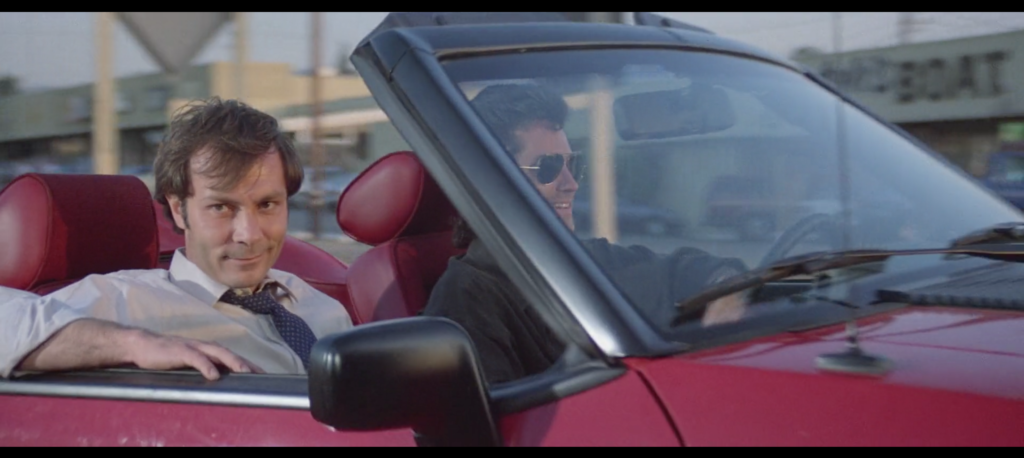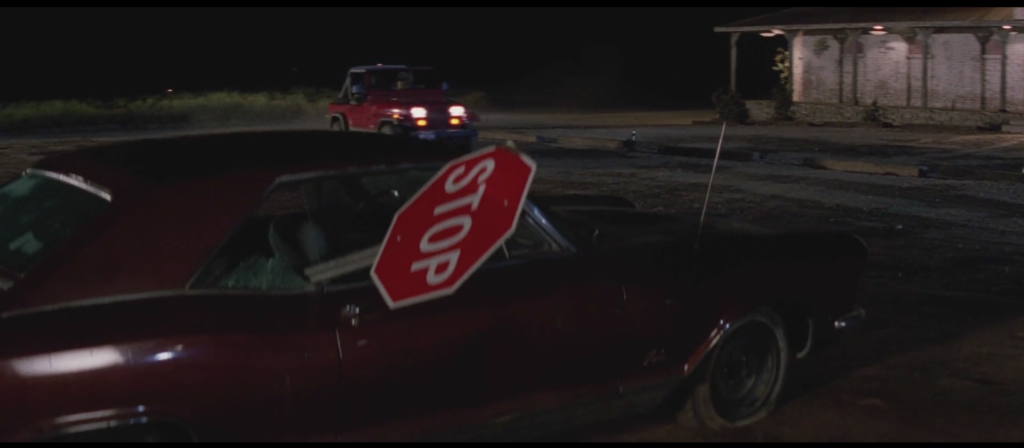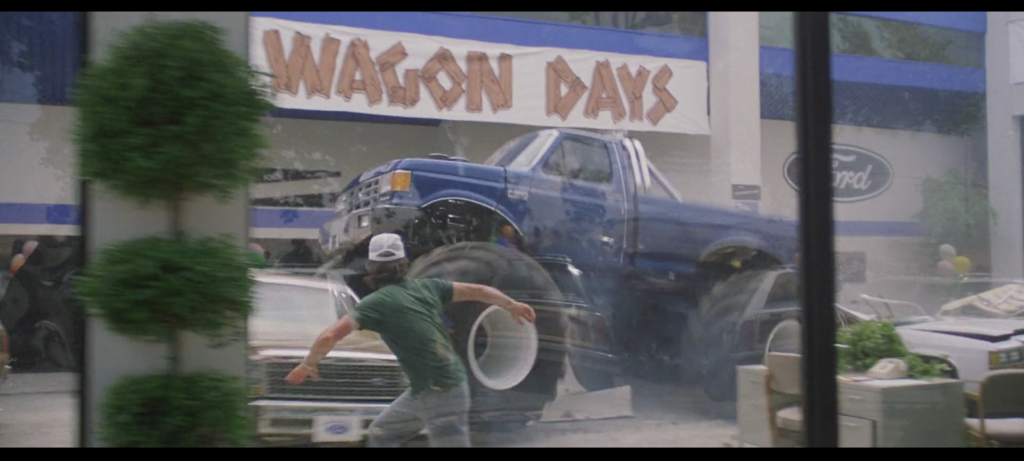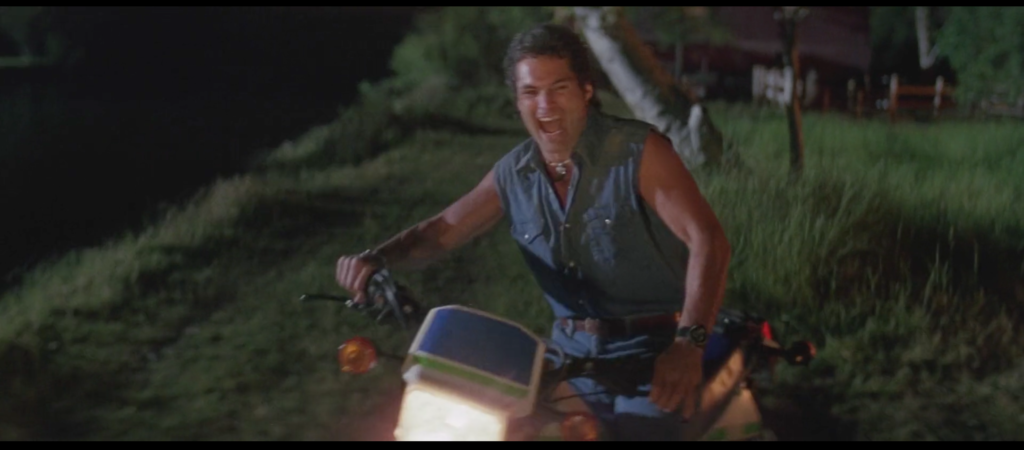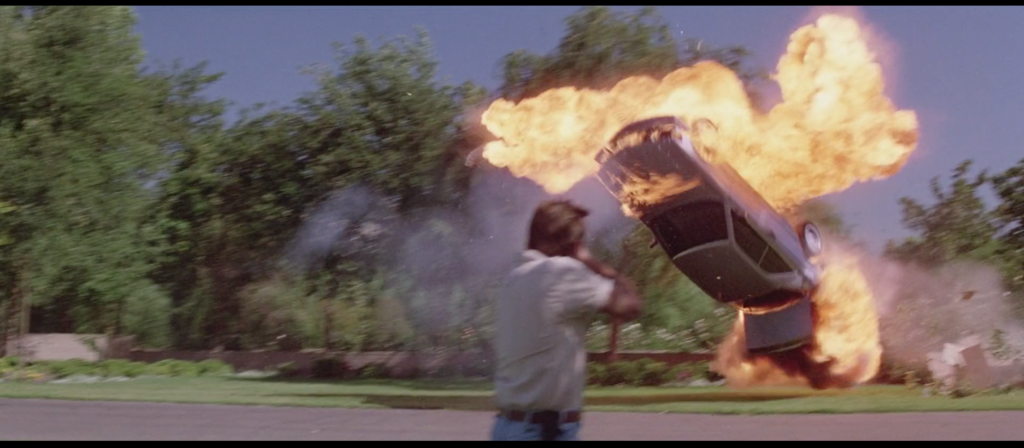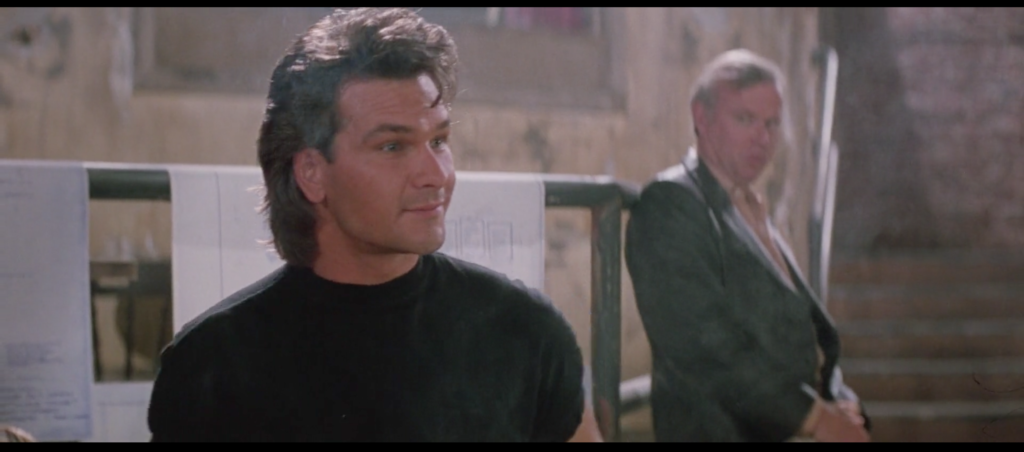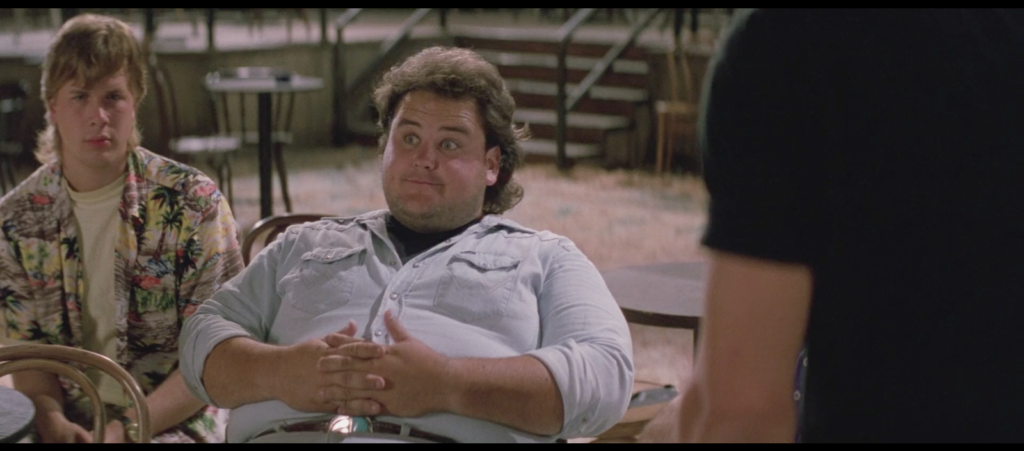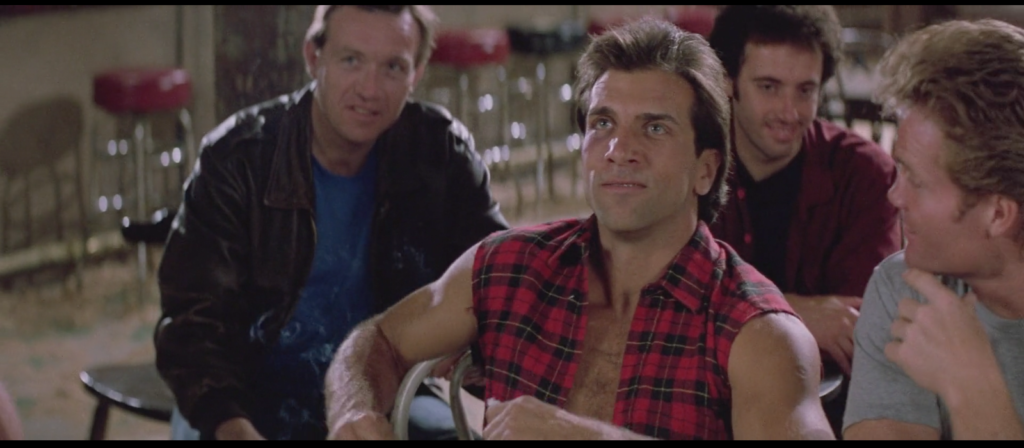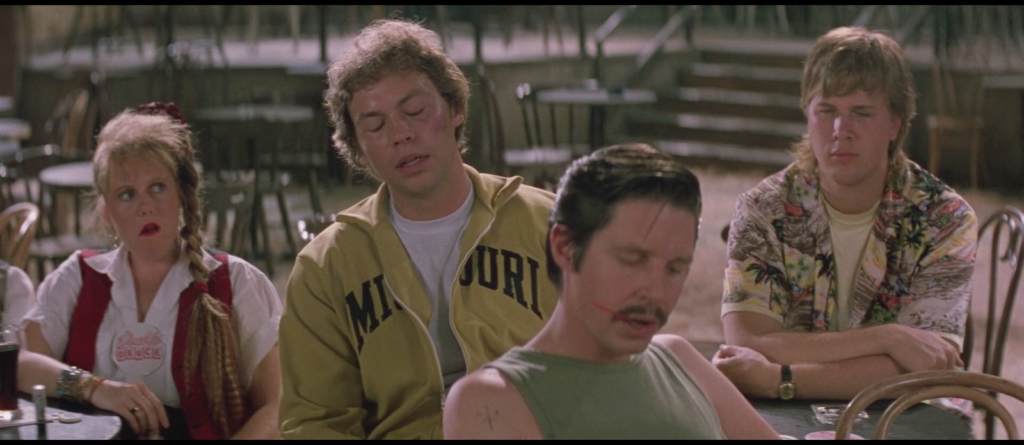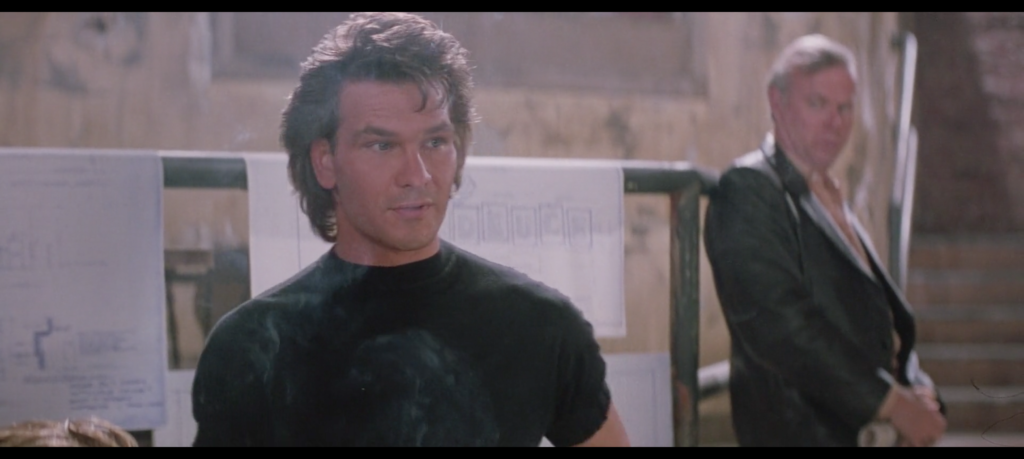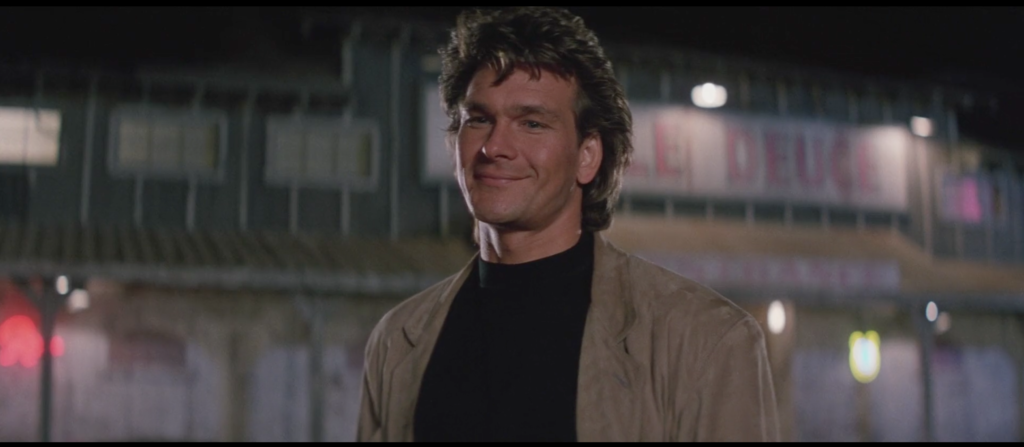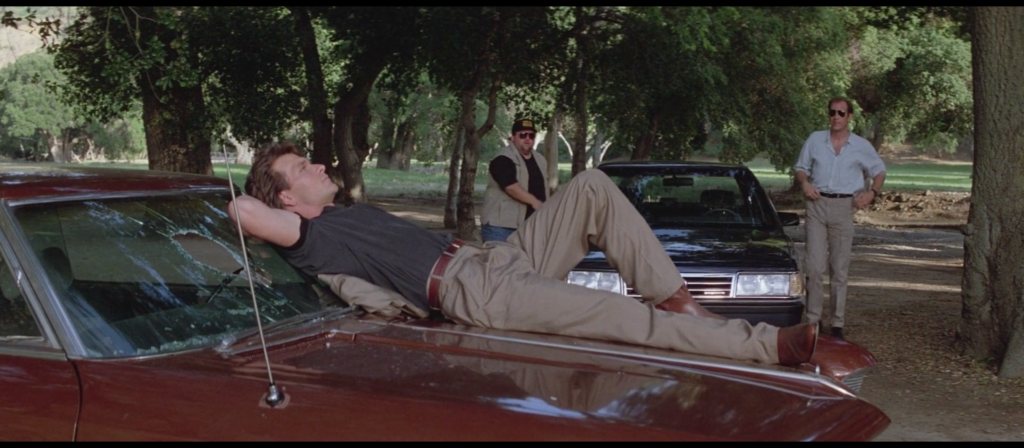Posts Tagged ‘the rules’
343. “Give me the biggest guy in the world: You smash his knee, he’ll drop like a stone”
December 9, 2019Discipline—that’s what you’re seeing on display here. Remarkably, Dalton has found himself on the losing end of a battle with a Korean War veteran wielding a spear. He’s been shot, he’s been mollywhopped, he’s exhausted from dodging each new swing and thrust. But never do his cooler instincts depart him, and why is that? Because he’s dedicated his entire life to being, in Frank Tilghman’s immortal words, the best damn cooler in the business. (Technically second-best—oh, wait, not anymore.) He is following his own rules. He is taking the threat presented by Brad Wesley, 7-Eleven impresario, very seriously. (“Never underestimate your opponent. Expect the unexpected.”) He has taken the fight to the man instead of waiting for the man to come to him. (“Take it outside. Never start anything inside the bar unless it’s absolutely necessary.”) He is aware of what time it is. (“Be nice…until it’s time to not be nice.”) And he is making use of one of the tricks of the trade—“Give me the biggest guy in the world: You smash his knee, he’ll drop like a stone.”
That is what it takes to lay Brad Wesley low: a blow to the knee, the same thing that enabled Dalton to make short work of Ketcham and allowed Wade Garrett to defeat Mountain. (Dalton may even have injured the knee of Jimmy against that tree during their fight to the death, though the angle makes it unclear.) A lesser man, having just incurred a gunshot wound after murdering four men and now finding himself being chased around a coffee table by a berserk mall developer in the taxidermy wing of his mansion, might forget that sort of thing in the heat of the moment. But when you’re a cooler, there’s no such thing as “the heat of the moment.” The cool is all there is.
226. “Take out the trash.”
August 14, 2019DALTON: I want you to be nice…until it’s time to not be nice.
YOUNGER: Well, how are we supposed to know when that is?
DALTON: You won’t. I’ll let you know. You are the bouncers. I am the cooler. All you have to do is watch my back—and each other’s…Take out the trash.
Submitted for your approval: O’Connor, beaten senseless by Wade Garrett, collapsing unconscious into a dumpster full of garbage. Essentially literally, Wade and Dalton watched each other’s backs and took out the trash. No more evidence of the efficacy of the Dalton Path’s Three Simple Rules need be presented. Everything is proceeding as he has foreseen.
183. The Third Rule, Verse 6
July 2, 2019“This is the new Double Deuce,” says Frank Tilghman. We are at the start of an all-hands staff meeting, and Tilghman is pointing to the concept art for the bar’s redesign. But standing nearby is his latest hire, Dalton. It is through Dalton, with Dalton, in Dalton that the new Double Deuce will be achieved. Dalton embodies the new Double Deuce. He is its future.
When Dalton takes over as cooler he becomes more than just the chief bouncer. His role is not to handle a series of discrete incidents, but to institute sweeping reforms that will eliminate such incidents forever. “It’s going to change,” he states—not a threat, not a promise, a fact. His bouncers, too, must change for this to take place. As below, so above.
Bouncing on the Dalton Path is a matter of following “three simple rules.”
This, for the final time, is the third.
3. Be nice (concluded)
Previously:
- The Great Commandment
- The Parable of Someone Getting in Your Face and Calling You a Cocksucker
- Walking the Dalton Path Together
- It’s a Job / It’s Nothing Personal
- Two Nouns Combined to Elicit a Prescribed Response
As our lessons have shown us, there is nothing simple about the simplest of the Three Simple Rules. Be nice: Those two words pack a world of meaning into their duosyllabic totality. Through parable and paradox and painstaking explication of every detail, Dalton slowly indoctrinates his disciples in the six letters (plus a space) that are the true determinant of the Dalton Path’s meandering course.
Naturally, the Dalton Path must include its own Path-annihilating destination.
3 (Revised). Be nice…until it’s time to not be nice.
That’s what Dalton wants. He says so. “I want you to be nice…until it’s time to not be nice,” he says, in so many words. This is the second time he’s given voice to his own desires when delineating the Third Rule, the other being “I want you to remember that it’s a job—it’s nothing personal.” We can hereby conclude first that nature of the work as work, as labor, is of central importance. Indeed we will see how this conception of the job allows Dalton both to assert that, as a laborer, he is entitled to all he creates, and how it gives him the detachment necessary to see himself (his self) as separate from the job that his self performs.
But it’s the second half that clues us in here. We recall that in saying “It’s nothing personal,” Dalton was employing the old “If you think this sentence is confusing, then change one pig” technique: He waltzed into these people’s place of business, fired several of them, told them his authority is absolute, noted what a bad job they’ve been doing, personally insulted them—sometimes via parable, sometimes via insinuation, always indirectly so as to stymie their righteousness in lashing back. If they managed not to take what he was doing personally, then they already will have understood the importance of not taking things personally.
Which brings us back to “Be nice…until it’s time to not be nice.”
“Well, uh, how are we supposed to know when that is?” asks Younger, the quietest of Dalton’s new believers.
“You won’t,” Dalton says. “I’ll let you know. You are the bouncers. I am the cooler. All I want you to do is watch my back—and each other’s…Take out the trash.”
We already know that the Dalton Path is a path we walk together. Here, at the end of the path, the point at which the Third Rule gives way to its opposite, where thesis becomes antithesis, where being nice becomes not being nice, is where we receive the most emphatic declaration of our collectivity.
It is not for us to know when the time to not be nice has come. We are but bouncers, seeing through a pint glass darkly. Dalton, the Cooler, will instruct us. And yet the cooler cannot be the cooler without his bouncers. He needs us to watch his back—and each other’s—just as much as we need him to tell us the day and the hour of the not-niceness.
This is all part of the same thought-flow, each point indistinguishable from the last. Without bouncers, the cooler cannot cool; without the cooler, the bouncers cannot bounce. Ad infinitum, world without end, amen.
And what are the Three Simple Rules, if not the cooler distilled to his intellectual essence, the flesh made Word? Time and time again we have seen how when released into a mind willing to receive them, they act independently, engendering the understanding required to understand them as they take their course. Each rule is Dalton made miniature, released into the Double Deuce of the mind, taking out the trash. And within ourselves, we have watched his back all along.
We will not know when the time has come to not be nice. We won’t need to. Dalton will tell us. He already has.
This marks the midpoint of Pain Don’t Hurt. Thank you for reading.
130. The Third Rule, Verse 5
May 10, 2019“This is the new Double Deuce,” says Frank Tilghman. We are at the start of an all-hands staff meeting, and Tilghman is pointing to the concept art for the bar’s redesign. But standing nearby is his latest hire, Dalton. It is through Dalton, with Dalton, in Dalton that the new Double Deuce will be achieved. Dalton embodies the new Double Deuce. He is its future.
When Dalton takes over as cooler he becomes more than just the chief bouncer. His role is not to handle a series of discrete incidents, but to institute sweeping reforms that will eliminate such incidents forever. “It’s going to change,” he states—not a threat, not a promise, a fact. His bouncers, too, must change for this to take place. As below, so above.
Bouncing on the Dalton Path is a matter of following “three simple rules.”
This, for the sixth time, is the third.
3. Be nice (continued)
Previously:
- The Great Commandment
- The Parable of Someone Getting in Your Face and Calling You a Cocksucker
- Walking the Dalton Path Together
- It’s a Job / It’s Nothing Personal
Whenever two or more nouns are gathered to call a name, there is hate.This is the difficulty—well, one of the difficulties, in addition to being barred from coming within 200 yards of Jasper High—facing Steve the Horny Bouncer. He has heard Dalton’s commandment. He has heard the parable of someone getting in your face and calling you a cocksucker. He’s heard about the power of community, the innate dignity of the laborer, and the fact that it, whatever it is, is nothing personal. He simply isn’t buying it.
“Uh-huh,” he says, the sarcasm dripping from his lips in sufficient quantity to stain his shirt, were he wearing one. “Being called a cocksucker isn’t personal?” Gyp Rosetti, you have a friend in Steve.
“No,” says Dalton coolly and confidently. (Considering the degree to which men routinely sexualize their antagonism toward him, I’d say this is a man who’s been called a cocksucker many, many times.) “It’s two nouns combined to elicit a prescribed response.”
Well goddamn, looks like he was a linguistics minor in NYU! Thanks there, Chomsky!
Of course, he’s right. One need look no further than the fact that this is my 130th essay about a movie called Road House in 130 days to see that combining two nouns in the right way can elicit one hell of a prescribed response. I have chosen to give myself over to that response, but that’s just it: I made a choice. Dalton is attempting to convince the skeptical Steve that he has a choice too, and he can choose to let that shit slide.
Steve, you will not be surprised to learn, is not buying it. However, while dumb, he is no dummy. He senses he will not be able to best Dalton in the squared circle of neurolinguistic programming. Better for him to take a new and even more direct approach:
“What if somebody calls my mama a whore?”
Actor Gary Hudson’s delivery of the word “whore” is remarkable, a cousin in its way to Joe Pantoliano as Ralph Cifaretto, exasperatedly insisting “She was a hooah.” He takes the word and purses his lips and shoots it out the side of his mouth, like he’s trying to send it scurrying out of the servant’s entrance before the Duchess arrives. Nervous laughter erupts. All that his smug look of triumph afterwards lacks is the voice of Ra’s al Ghul from Batman: The Animated Series saying “Checkmate, Detective” or some shit.
Which leaves him wide open for Dalton’s riposte:
“Is she?”
Nervous laughter bubbles up again, at Steve’s expense this time. His smile sours. He takes the napkin or whatever he’s been tearing up OCD-style and tosses the latest shred to the ground in a rage. Anything he says would imply acceptance of Dalton’s framework, that rather than being some outlandish insult, the notion that Steve’s mother is a sex worker is a matter of some debate. Not since Dalton told Morgan “opinions vary” has he so thoroughly shut someone down.
Note that Dalton himself is agnostic on the issue. I’m not claiming any kind of “sex work is work” points for Dalton; this was an era in which even an NYU philosophy major may not have encountered this kind of thinking, and moreover his attitude toward Denise after her topless dance smacks of SWERFiness. And yet one is reminded, is not one, of Matthew 26:63-64: “And the high priest answered and said unto him, I adjure thee by the living God, that thou tell us whether thou be the Christ, the Son of God. Jesus saith unto him, Thou hast said.” Tou-fuckin-ché, Caiaphas.
And so it us unto you, Horny Steve. You have just given Dalton the rope to hang you with, rhetorically. When you diss Dalton, you diss yourself, and in so doing you yourself have set up the perfect demonstration of the wisdom of “Be nice.” Did Dalton say anything insulting? You’ll notice he did not! He left it to his foe to be his own undoing. Petard, here be thy hoist.
129. The Third Rule, Verse 4 Revisited
May 9, 2019“This is the new Double Deuce,” says Frank Tilghman. We are at the start of an all-hands staff meeting, and Tilghman is pointing to the concept art for the bar’s redesign. But standing nearby is his latest hire, Dalton. It is through Dalton, with Dalton, in Dalton that the new Double Deuce will be achieved. Dalton embodies the new Double Deuce. He is its future.
When Dalton takes over as cooler he becomes more than just the chief bouncer. His role is not to handle a series of discrete incidents, but to institute sweeping reforms that will eliminate such incidents forever. “It’s going to change,” he states—not a threat, not a promise, a fact. His bouncers, too, must change for this to take place. As below, so above.
Bouncing on the Dalton Path is a matter of following “three simple rules.”
This, for the fifth time, is the third.
3. Be nice (continued)
Previously:
- The Great Commandment
- The Parable of Someone Getting in Your Face and Calling You a Cocksucker
- Walking the Dalton Path Together
- It’s Nothing Personal
But there’s more to Verse 4, isn’t there? Dalton doesn’t merely tell his acolytes that bouncing is nothing personal. He chooses to emphasize that bouncing is a job. Bouncing is work. Bouncing is labor. Through this lens, perhaps, we can arrive at the cod Marxism for which Road House has been crying out for years.
We’ve discussed one interpretation of the latter portion of this verse already—the need to maintain a level head, a distanced perspective, the ability to distinguish between professional challenges to be surmounted and personalized challenges to be destroyed.
At this point Dalton could, and indeed at a subsequent point he will, emphasize the “sticks and stones may break my bones” element. He could, and will, insist that though they will be dealing with physically and verbally aggressive patrons, those patrons have no insight into the men bouncing them and thus their words and deeds carry no true weight. That’s one interpretation of “it’s nothing personal,” and it’s valid.
But what does Dalton mean by counterposing “it’s nothing personal” with “it’s a job”? By situating bouncing within the context of labor and setting this up in opposition to the personal, he is underlining—and not for the first time—the communal nature of the task. The bourgeois conception of personhood, atomic individualism, false individual consciousness, Thatcher proclaiming “there is no such thing as society”: These have no place Dalton’s philosophy. When you do a job you do so in concert with your fellow workers, and, ideally, for the benefit of workers as a class.
You are no Morgan, searching for opportunities in which to vent your rage and exercise power at the expensive of the collective.
You are no Pat, enriching yourself at your fellows’ expense.
You are no Steve, fucking young women of uncertain age in the breakroom, or Judy, selling cocaine in the bathroom, indulging in hedonistic pursuits while others shoulder your burden.
“You are the bouncers,” Dalton says at the end of the Giving of the Rules. You are the proletariat. Through your labor the value of the Double Deuce is derived, a fact which is made plainer and plainer as the film goes on.
“I am the cooler.” Dalton is the vanguard. He seizes power with the intent of awakening the wider class of bouncers to their revolutionary potential and diffusing that power among them, and unlike other vanguardist movements he does so.
“Watch my back and each other’s.” Solidarity forever.
“Take out the trash.” Up against the wall, motherfuckers.
125. “I didn’t know she could sing!”
May 5, 2019If this configuration of Dalton and his padawan-learner Jack looks familiar, it’s because we’ve been here before. The exchange and fight scene that are about to occur are perhaps the purest distillation of the Dalton Path in the entire film, following the Three Simple Rules and their various chapters and verses to the letter. As a bonus they show the primacy and utility of Jack among the Double Deuce’s other bouncers. It is Jack, after all, to whom Dalton relays the Riddle of the Right Boot, counting on the younger man to solve it. When they move on the intruders who’ve come to the bar to murder a man by kicking him in the head with a boot-mounted knife on account of the fact that he fired a rich guy’s nephew, they move as one.
But how did they arrive at this point? By what strange magic were Dalton and Jack united at this moment? The magic…of rock.
Specifically Carrie Ann’s variant thereof. The big-grinned barmaid with the bangs has traditionally occupied a privileged position in Dalton’s orbit. It is she to whom he first entrusts the secret of his name. It is she who preaches his name to the other barfolk. It is she who is granted a glimpse of the ass.
Now that the Double Deuce has been cleaned up, it is she who takes the stage to demonstrate this fact to the viewer. Would any woman have been caught dead on the stage of the old Double Deuce, where the only thing separating you from the ravening hordes, whose attention is drawn to and focused on that stage in a way no other staffer or patron can claim, was a thin chickenwire line? To be honest, dead might be the only way a woman would get caught on that thing. Putting a blind guy up there strikes me as some kind of ADA violation as it is.
But now things are different. How different? Different enough that a server is up there singing her gorgeous, joyful heart out. (Kathleen Wilhoite is truly one of this movie’s MVPs; I have no doubt from the way she shakes and grooves and grins and at one point even puts her hand to her face like “holy shit I can’t believe this!” is a sign of completely sincere pleasure on the part of the actor herself.) A few weeks earlier she had to save all her vocal power for yelling “BASTARD!” at people she’d just brained with a beer bottle in a barfight. Now she’s singing Eddie Floyd with the Jeff Healey Band.
That’s why Jack drifts over to Dalton that night: Just to smile with delight and say “I didn’t know she could sing!” He’s so happy in that moment, so happy to see someone he thought he knew reveal a new and exciting side of herself, so happy to know that as a bouncer on the Dalton Path he helped make that happen. It’s his desire to share that happiness that puts him by Dalton’s side when Ketchum strides in, anonymous minions by his side, to try to kickstab Dalton in the skull. The right place at the right time, that time being “time to not be nice.”
Call it a coincidence if you want, or even synchronicity. I call it the ne plus ultra illustration of the Third Rule, and of how the obervance of that rule yields dividends none could predict. Be Nice, commands Dalton. So mote it be.
114. The Nine
April 24, 2019Nine quarters, says the sign that appears in the middle of Dalton’s pivotal conversation with Wade Garrett, right after he blows off the threat presented by Brad Wesley. Right away we can see that reality has warped a little, that a glitch in the matrix has appeared. As well it might: Dalton has just underestimated his opponent and failed to expect the unexpected, a violation of his own First Rule. And for that, a price must be paid.
But what if there’s more to it than that?
It was not I who set myself on this path, but reader @RoddySwears. It was he who noted the numerological significance of the established price. Nine quarters. Two dollars and twenty-five cents. $2.25. 2 + 2 = 9.
What could such a specific prophecy mean?
Then I realized.
The Nine are abroad.
101. The Third Rule, Verse 4
April 11, 2019“This is the new Double Deuce,” says Frank Tilghman. We are at the start of an all-hands staff meeting, and Tilghman is pointing to the concept art for the bar’s redesign. But standing nearby is his latest hire, Dalton. It is through Dalton, with Dalton, in Dalton that the new Double Deuce will be achieved. Dalton embodies the new Double Deuce. He is its future.
When Dalton takes over as cooler he becomes more than just the chief bouncer. His role is not to handle a series of discrete incidents, but to institute sweeping reforms that will eliminate such incidents forever. “It’s going to change,” he states—not a threat, not a promise, a fact. His bouncers, too, must change for this to take place. As below, so above.
Bouncing on the Dalton Path is a matter of following “three simple rules.”
This, for the fourth time, is the third.
3. Be nice (continued)
“I want you to remember,” says Dalton, “that it’s a job. It’s nothing personal.”
Thus far, Dalton has explained the third and simplest of his Three Simple Rules in comparatively painstaking detail. He has articulated its Great Commandment. He has preached the Parable of Someone Getting in Your Face and Calling You a Cocksucker. He has emphasized its communal nature. And now he says it’s nothing personal?
I’d like to take this opportunity to introduce you to a man named Gyp Rosetti.
ROSETTI: “Bone for tuna.”
TONINO: What?
ROSETTI: “Bone for tuna.” What the fuck’s that’s supposed to mean?
TONINO: Oh. The kid’s Irish. The pronunciation was off. I think he meant—
ROSETTI: I know what he meant. Who the fuck is Nucky Thompson to wish me good luck? And in Italian, no less, like he’s mocking me? He’s real cute, I’ll fucking tell you. Sets me up to lose, pulls our whiskey deal at the last minute, then it’s buon fortuna like he’s rooting for me to get back on my feet. Push me off a cliff, why don’t you.
TONINO: Sure, I mean—
ROSETTI: Good luck flapping your arms on the way down! Am I right?
TONINO: Sure, I mean—
ROSETTI: Real attitude on him. Scrawny Irish prick. I need his blessing to make my way in the world?
TONINO: He w—
ROSETTI: I need him? To lecture me? “Nothing’s personal”? What the fuck is life if it’s not personal?
So you can see Dalton’s dilemma. Here he is, new in town, new in the job, new to these men, whose job it is to physically fight, restrain, and eject other men. His first order of business is to fire two of their coworkers, neither particularly well-liked, but each emblematic over his power over their employment and thereby their lives. He’s told them It’s my way or the highway and rattled off a list of undesirables who frequent the bar, a state that’s going to change. The implication is clear: His way is superior to theirs, which has demonstrably failed. From there he launches into a disquisition on bouncer conduct that is rife with paradox and contradiction as well as comprising a nearly diametrically opposed approach to the craft than that which they have heretofore pursued. After all this, after telling these violent men how to do their violent jobs by moderating their interactions with other violent men under the threat of termination, Dalton has the temerity to tell them that when the time comes and they are being pelted with verbal and physical abuse and they must decide whether and how to strike back, that all of this is nothing personal? Doesn’t he see how they would take this? Doesn’t he know it reads as insanely pollyannaish at best, insulting at the most reasonable, and downright dangerous at worst? When confronted with well-meaning advice by someone with whom you are at odds—and what is a worker if not at odds with the boss—even the most anodyne bromide, like wishing an associate “good luck” in his native language when a business deal goes south, feels like fighting words. Doesn’t Dalton realize that telling these men in this context that this job is nothing personal is tantamount to throwing down the gauntlet and fucking daring them to take it personal?
Yes. Yes he does.
If you think this sentence is confusing, then change one pig.
(to be continued)
083. Table spot
March 24, 2019DALTON: Morgan, you’re outta here.
MORGAN: …what the fuck you talking about?
DALTON: You don’t have the right temperament for the trade.
Hard to argue with that, huh? As a bouncer, Morgan does not seem to have specialized or differentiated his skill set from that which he applies to his parallel career as a Brad Wesley goon. The nominal purpose shifts from “protect the business interests of Brad Wesley” to “protect the peaceful atmosphere of the Double Deuce,” but insfoar as he simply ports the methods of the former to the latter, he’s doing far more harm than good. The table we see him shatter with another human beings body by throwing that body through that table from a height isn’t even the first table we’ve seen him fuck up in this basic way that evening, having ejected the Nipple to Nipple guy by wallopping him into a bunch of paying customers seated around one a few minutes earlier. (One of those customers was Foxworthy, so it’s hard to feel too bad about it, but still.) Not only is Morgan likely the most dangerous person in the bar to patrons of the bar, he’s also one of the most destructive to its property—and to their drink orders, at least one of which the guy above plummets through on his way to the ground. If Morgan’s job truly is to keep the peace in the Double Deuce, he really should start by bouncing himself.
That said, there is a pot/kettle element to Dalton’s callout of Morgan’s mien and methods. You’ll recall, of course, that Dalton’s first order of business upon officially assuming the position of cooler is firing Morgan during an all-hands meeting, as quoted above. But what is his first order of business upon officially assuming the position of cooler once the bar opens for business later that day? Breaking a table with a human face. Hypocrisy much?!?!?!
I doubt it. That’s not really Dalton’s style. As our examination of the Rules has made clear, apparent paradox and contradiction is virtually always a method of education via self-enlightenment. From this we can conclude that Dalton’s objection is not to breaking tables with human beings per se, but the mindset, method, and result of same. The Rules are instructive here, as they always are. “Never underestimate your opponent—expect the unexpected”? Look at Morgan’s face and tell me he’s not feeling the outrage of man who cannot believe what others have dared to do to him. “Take it outside—never start anything inside the bar unless it’s absolutely necessary”? Morgan is deeply inside his feelings; he has the object permanence of a furious toddler and fails to understand that no problem truly starts inside the bar, and thus can not properly assess the necessity of responding inside the bar in turn. “Be nice—until it’s time to not be nice”? I feel it’s safe to say that if you materially contributed to escalating a couple of punches thrown at Gawker by Sharing Husband into a rumble involving two dozen combatants capable of leveling the entire seating area, the time to not be nice had not yet arrived. Only the mind of a cooler knows the day and the hour. Morgan, you’re outta here.
069. The Third Rule, Verse 3
March 10, 2019“This is the new Double Deuce,” says Frank Tilghman. We are at the start of an all-hands staff meeting, and Tilghman is pointing to the concept art for the bar’s redesign. But standing nearby is his latest hire, Dalton. It is through Dalton, with Dalton, in Dalton that the new Double Deuce will be achieved. Dalton embodies the new Double Deuce. He is its future.
When Dalton takes over as cooler he becomes more than just the chief bouncer. His role is not to handle a series of discrete incidents, but to institute sweeping reforms that will eliminate such incidents forever. “It’s going to change,” he states—not a threat, not a promise, a fact. His bouncers, too, must change for this to take place. As below, so above.
Bouncing on the Dalton Path is a matter of following “three simple rules.”
This, once more, is the third.
3. Be nice. (continued)
We’ve established the Third Rule’s Great Commandment, and we’ve examined its combination of theory and praxis. Today’s lesson follows closely in the latter’s footsteps. Almost literally, insofar as it’s about walking.
You’ll recall that the previous lesson introduced the parable of the man who gets in your face and calls you a cocksucker. In the lines that follow, Dalton continues the story. “Ask him to walk,” he advises his bouncers regarding such a person, “but be nice. If he won’t walk, walk him, but be nice. If you can’t walk him, one of the others will help you, and you’ll both be nice.”
By now his voice is pleasant, almost cheerful, the “it’s my way or the highway” edge to it long gone. It stands to reason, since the whole point of this passage is that neither he nor anyone else need walk his way alone. You can do so side by side, arm in arm, perhaps even hand in hand. Indeed his delicate double-handed gesture when he says “and you’ll both be nice” suggests nothing so much as a pair of children playing “Heart and Soul” together on the piano in the school music room.
This is the least difficult portion of the rules so far from which to glean the hidden moral instruction beneath the practical element. By way of comparison, eep in mind that “turn the other cheek” was as literal as it gets, at least within the context of the sentence in which Jesus introduced the concept: You get socked in the side of the face, you offer up the other side too. Yet hundreds of millions of people over thousands of years had no trouble figuring out what he was getting at.
I’d like to think that Jack, Hank, and Younger understand that Dalton is talking about more than just the problem introduced by Hank at the start of the Giving of the Rules: “A lot of the guys who come in here, we can’t handle one-on-one, even two-on-one.” Aiding a fellow bouncer in the ejection of a particularly recalcitrant or powerful patron is important. Even reiterating that the purpose of bouncing is to bounce the patron out of the bar, not bounce his head off of it, is important. But is “If he won’t walk, walk him,” so far removed from “it was then that I carried you”? Is “one of the others will help you” so different from “For where two or three are gathered together in my name, there am I in the midst of them”? Seeing yourself as part of a whole that includes the patrons, the bouncers, and the bar—that is the key that unlocks the new Double Deuce, the nice Double Deuce, a house with many mansions. When you walk through the storm, hold your head up high, and don’t be afraid of the dark.
061. The Third Rule, Verse 2
March 2, 2019“This is the new Double Deuce,” says Frank Tilghman. We are at the start of an all-hands staff meeting, and Tilghman is pointing to the concept art for the bar’s redesign. But standing nearby is his latest hire, Dalton. It is through Dalton, with Dalton, in Dalton that the new Double Deuce will be achieved. Dalton embodies the new Double Deuce. He is its future.
When Dalton takes over as cooler he becomes more than just the chief bouncer. His role is not to handle a series of discrete incidents, but to institute sweeping reforms that will eliminate such incidents forever. “It’s going to change,” he states—not a threat, not a promise, a fact. His bouncers, too, must change for this to take place. As below, so above.
Bouncing on the Dalton Path is a matter of following “three simple rules.”
This, again, is the third.
3. Be nice. (continued)
When first we assayed the Third Rule, I said the following:
It is the shortest rule, and it requires the most explanation. It is the least practically minded rule, and it is illustrated with the most practical applications. It is a rule about being kind to others, on the surface at least, and it is the rule greeted—and at times delivered—with the most open incredulity, even hostility.
When Dalton tells the assembled staff of the Double Deuce to be nice, it is Jack the bouncer who, whether in spite or because of being Dalton’s best student, opens the door for doubt. “Come on,” he says, gently but with unmistakable disbelief. He’s trying to ask his new sensei “Are you out of your mind?” in the politest possible way.
Now comes the yin-yang instructional configuration that should be familiar to us as central to the Giving of the Rules. Dalton leans forward and tells Jack “If somebody gets in your face and calls you a cocksucker, I want you to be nice.” Jack responds with a skeptical “Ohkayy”—and, though he knows it not, passes the test Dalton has just given him in so doing. Dalton got in his face and called him a cocksucker, and he was nice. It takes the doing of the thing to see that it can be done and learn how to do it. If you think this sentence is confusing, then change one pig.
(to be continued)
057. “It’s my way or the highway.”
February 26, 2019Dalton, during the prologue of The Giving of the Rules: “It’s my way or the highway.”
The highway:
Show me the lie.
Whether by accident or design—who can say? alright I can say, it’s by accident—there is no aphorism, no catchphrase, no idiomatic expression, no imbecilic threat or come-on or dick joke in the entirety of this film that does not bear close, even literal, reading. This is what I want to impress upon you more than anything else. This is what inspired this project: the sense that in the 15 years I’ve been watching this movie I haven’t touched bottom any more than you might during a swim in the middle of the ocean. Road House is a journey of discovery, a highway if you will, and the higher you fly the deeper you go the deeper you go the higher you fly so come on come on come on it’s such a joy.
050. The Third Rule
February 19, 2019“This is the new Double Deuce,” says Frank Tilghman. We are at the start of an all-hands staff meeting, and Tilghman is pointing to the concept art for the bar’s redesign. But standing nearby is his latest hire, Dalton. It is through Dalton, with Dalton, in Dalton that the new Double Deuce will be achieved. Dalton embodies the new Double Deuce. He is its future.
When Dalton takes over as cooler he becomes more than just the chief bouncer. His role is not to handle a series of discrete incidents, but to institute sweeping reforms that will eliminate such incidents forever. “It’s going to change,” he states—not a threat, not a promise, a fact. His bouncers, too, must change for this to take place. As below, so above.
Bouncing on the Dalton Path is a matter of following “three simple rules.”
This is the third.
3. Be nice.
The three simple rules for bouncing my Jasper road house all contain and account for their own direct contradiction. More than that, they depend on the aspirant’s ability to formulate that contradiction to be fully understood. Thus “Never underestimate your opponent; expect the unexpected” conveys both that chance will always break in the enemy’s favor and that a true brother bouncer—the unmentioned ally in a rule nominally covering the adversary—leaves nothing to chance at all. “Take it outside; never start anything inside the bar unless it’s absolutely necessary” is as much about one’s headspace as it is about one’s physical space, such that participation in a fight that takes place within the building is a requisite condition for obeying the rule in the first place. Even Dalton’s prefatory statement “All you have to do is follow three simple rules” is best thought of through the formulation of the philosopher Linda Richman: They are neither three nor simple nor rules nor followed.
So. The Third Rule. It is the shortest rule, and it requires the most explanation. It is the least practically minded rule, and it is illustrated with the most practical applications. It is a rule about being kind to others, on the surface at least, and it is the rule greeted—and at times delivered—with the most open incredulity, even hostility.
All this is necessary. One must see the complicated clockwork mechanism behind the simplest maxim. One must learn that on the Dalton Path, all philosophy is applied philosophy. One must be goaded into anger to understand the nature and value of its opposite. These things the Third Rule anticipates, mandates, births into being. This simplest of the three simple rules is alone in meriting a fuller and more complex reformulation from the Giver of the Rules, a new testament to unlock the old. It is the Great Commandment. It is not come to destroy, but to fulfil.
3. Be nice…until it’s time to not be nice.
to be continued
040. The Second Rule
February 9, 2019“This is the new Double Deuce,” says Frank Tilghman. We are at the start of an all-hands staff meeting, and Tilghman is pointing to the concept art for the bar’s redesign. But standing nearby is his latest hire, Dalton. It is through Dalton, with Dalton, in Dalton that the new Double Deuce will be achieved. Dalton embodies the new Double Deuce. He is its future.
When Dalton takes over as cooler he becomes more than just the chief bouncer. His role is not to handle a series of discrete incidents, but to institute sweeping reforms that will eliminate such incidents forever. “It’s going to change,” he states—not a threat, not a promise, a fact. His bouncers, too, must change for this to take place. As below, so above.
Bouncing on the Dalton Path is a matter of following “three simple rules.”
This is the second.
2. Take it outside. Never start anything inside the bar unless it’s absolutely necessary.
A bouncer less wise than Dalton would think Rule 2 begins and ends right here. How much more could there possibly be to this purely practical commandment? Your job is to maintain a convivial atmosphere for the patrons of your establishment by keeping the bad element at bay. You can’t do this if you’re beating the shit out of a guy on the dance floor. Ergo, you either force or lure your opponent out of the bar—your ultimate goal at any rate—before engaging in fisticuffs. What else is there?
What else indeed. As you can no doubt imagine, many, many violent incidents occur at the Double Deuce between this speech and the end of the movie. Dalton and his men take it outside a grand total of once during that time. Dalton in fact grabs a guy by the back of the head and smashes his face through a table this very night. What conclusion can we draw from this?
What we have here is another “If you think this sentence is confusing, then change one pig” situation.
Let’s start with the assumption that Dalton, as evidenced by his own actions, must intend this rule to have some larger meaning beyond its (eminently sensible) practical application regarding the bouncer’s ideal field of battle. I would suggest that we look to the Third Rule for the key to unlock this mystery. A thorough examination of that rule must wait for another day, but for now suffice it to say “It’s nothing personal” is a central component.
Could it be the case that in commanding the staff of the Double Deuce to “take it outside” when the moment of truth arrives, what Dalton really means is to step outside themselves? Those who follow the Dalton Path must see themselves as parts of a greater whole. They are but tools in the hands of the Cooler; does the hammer hate the nail? They are the immune system of the bar-organism; does the white blood cell hate the infection in the wound? The bouncer is the agent of Gemeinschaft. Proper function necessitates depersonalization so that the wider view may come into focus.
Now let us go further. What is it to “start something inside the bar”? We have already learned that many of the forces that threaten the Double Deuce are not conflicts that arise organically between patrons, but deliberate infiltration and provocation directed by an outside agent: Brad Wesley. Wesley himself is merely a symptom of larger societal crises: capitalism generally, the tyranny of the small business owner specifically, toxic masculinity, and even, as we will see when we enter his Trophy Room, ecological destruction.
Moreover, let us not allow “conflicts that arise organically between patrons” to pass by unremarked upon. Dalton identifies the Double Deuce’s problematic clientele as “Forty-year-old adolescents, felons, power drinkers, and trustees of modern chemistry.” Cultural neoteny, the carceral state, alcoholism and addiction, and the role of business and government in fomenting all of the above: One need not absolve the meathead or the Knife Nerd of personal responsibility to correctly argue that they themselves are often victims of forces far beyond their control.
Now let us return to the Second Rule. “Never start anything inside the bar unless it’s absolutely necessary,” says the man who will break a piece of the bar’s furniture in half with another human being’s face just a few short hours later. Who is he really addressing here, and what is he saying to them? Is he simply telling the bouncers (and waitstaff and bartenders and band members and the unknown entity in the brown jacket) to avoid throwing hands inside these four walls? Or is he employing paradox to demonstrate that nothing ever truly starts inside the bar—that while the Dalton Path offers a safe route through the bar for all who choose to walk it, it is a road without beginning or end?
For our struggle is not against flesh and blood, but against the rulers, against the authorities, against the powers of this dark world and against the spiritual forces of evil in the heavenly realms. (Ephesians 6:12)
031. The First Rule
January 31, 2019“This is the new Double Deuce,” says Frank Tilghman. We are at the start of an all-hands staff meeting, and Tilghman is pointing to the concept art for the bar’s redesign. But standing nearby is his latest hire, Dalton. It is through Dalton, with Dalton, in Dalton that the new Double Deuce will be achieved. Dalton embodies the new Double Deuce. He is its future.
When Dalton takes over as cooler he becomes more than just the chief bouncer. His role is not to handle a series of discrete incidents, but to institute sweeping reforms that will eliminate such incidents forever. “It’s going to change,” he states—not a threat, not a promise, a fact. His bouncers, too, must change for this to take place. As below, so above.
Bouncing on the Dalton Path is a matter of following “three simple rules.”
This is the first.
1. Never underestimate your opponent. Expect the unexpected.
To the uninitiated, Rule One sounds like it ought to be Rules One and Two. The first part dictates that one cannot take victory for granted no matter the look of the foe, wisdom borne out time and time again throughout the film. Old men prove to be exceptionally capable fighters. Heavy men move at speeds men half their size can’t match. And as the Knife Nerds amply demonstrate, even the most rat-faced and weaselly goons can carry death in their denim. You underestimate these men at your peril. Assume anyone you face in open combat, even the bleeders and the sister-sons, can and will kill you if given the chance.
Expecting the unexpected is a different matter, or so it seems at first glance. Sometimes that means anticipating that a would-be assassin has a boot-mounted knife, or that a business dispute will be settled with a monster truck, certainly. But the unexpected could also be advantageous, could it not?
Not for the purposes of Rule One, no. The combination of these two diktats is not arbitrary. By wedding the latter to the former, Dalton suggests that the unexpected always breaks in favor of your opponent: a bootblade stabbing at a human face, for ever. The bouncer must accept this.
But the inverse is also true. If never underestimating your opponent necessarily and coterminously entails expecting the unexpected, it follows that a rational assessment of your allies deems them perfectly reliable. You don’t need to wonder whether your fellow bouncers can help you. You can bank on it. They will never disadvantage you in unexpected ways like your enemies might. Your comrades will be there and be true. You can expect it. “Watch my back and each others’,” Dalton says near the conclusion of the Giving of the Rules. But with the First Rule, he’s said it already.
It’s a bit of an “If you think this sentence is confusing, change one pig” situation, isn’t it: For bouncers to be perfected, they must follow Dalton’s three simple rules, the first of which takes their preexisting perfection for granted. But simply by turning the First Rule around in their minds the bouncers of the Double Deuce are that much further along the Dalton Path. They begin thinking every enemy with the wary respect you show a large animal or an operating piece of heavy machinery. They envision scenarios that will surprise and shock them, and thus begin to take those surprises and shocks in stride. In so doing they become people who are unsurprising, consistent, dependable, stalwart—each man a hidden blade in the boot that is the bouncer corps, expertly wielded by the cooler’s outstretched leg, working in concert against all the goons that were or are or will be.
020. Nothing personal
January 20, 2019“I want you to remember that it’s a job. It’s nothing personal.” We’ll be exploring of Dalton’s three simple rules for bouncing my Jasper road house in depth as the year progresses, but this elaboration of Rule Three, “Be nice,” bears scrutiny here in this early stage of the game. If you want to know what Dalton’s about, you need to see how seriously he takes not taking things personally. For now.
On Dalton’s first night on the job—the night of the Giving of the Rules—he makes a lot of enemies. He fires Morgan the bouncer for being a rat-bastard sadist and Pat McGurn the bartender for stealing from the register; both these men are members of the Wesley outfit and will repeatedly attempt to murder Dalton for costing them their jobs at what is, let’s face it, a complete shithole. He fires Steve the bouncer for having sex with teenagers on the job and he fires Judy the waitress (not that anyone ever says her name in the movie, of course) for dealing drugs on the job; neither shows up again but it’s hard to imagine losing their sexually and/or financially lucrative side hustles along with their day jobs sits particularly well with them. He also encounters a man who reacts to being asked to escort his girlfriend off the table she’s dancing on by whipping out a switchblade and threatening to stab a bouncer to death, and uses this man’s face to break a separate table in half before throwing him out; provided he hasn’t suffered a brain injury, my guess is he’s pissed off about it.
So there’s no surprise, and no shortage of suspects either, when Dalton walks outside and sees that his new car has had its windshield shattered, its antenna broken, and all four of its tires slashed.
Dalton saw this coming, of course. As previously mentioned, he makes it a habit to buy a beat-up used car while he’s working, knowing how the people he alienates tend to react. But this isn’t grudging acceptance of a bad situation, the way you might grumble standing on line at the grocery store the night before a big snowstorm. When Dalton sees what’s been done to his car, which will require him to jack and replace all four tires at a minimum before he can even think of addressing the other problems, he simply smiles and shakes his head. He’d shoot the same you-gotta-laugh look if he had a toddler who just covered her hair with peanut butter.
This is the face of a man who has a job, who does the job, and who does not take the job personally. His background in philosophy might help. Same with his study of tai chi. And in general he reverts to “laid back” as a default setting when external stressors are absent. And I mean that literally: When Wesley sends his goons Tinker and O’Connor, who recently tried to murder him and got their clocks cleaned for their troubles, to fetch him for a sit-down, he’s lying on the car that their fellow goons most likely vandalized the way a normal person might relax on a hammock.
But the “it’s a job, it’s nothing personal” thing is crucial to understanding the transformation Jasper, Missouri forces him to undergo. With each scene, you can watch his progress from one end of that spectrum to the other. Just know that this is where he starts.

